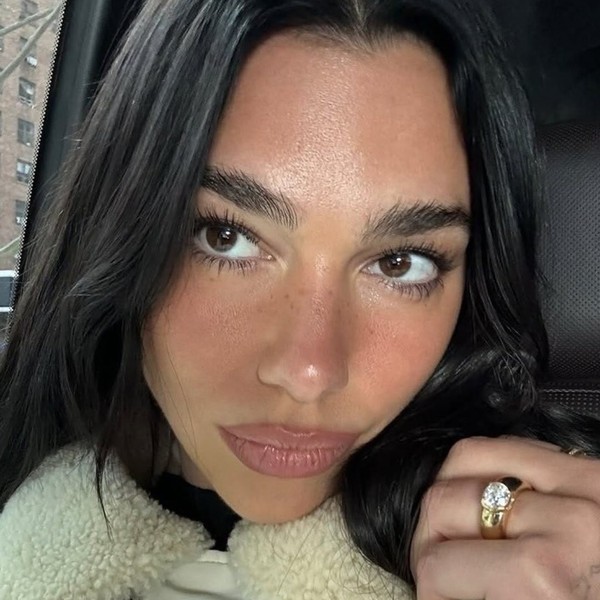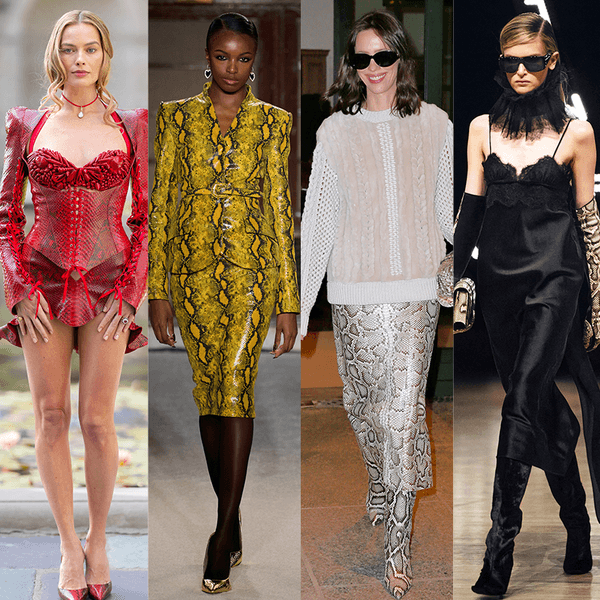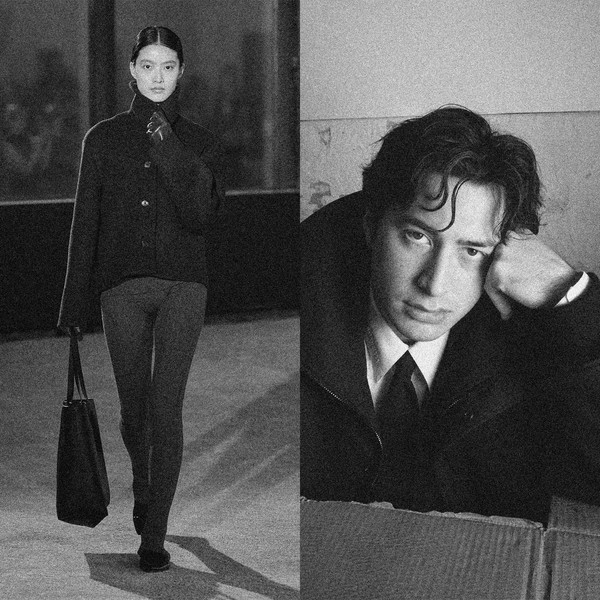An Honest Discussion about Aging Gracefully
Poking holes in the taboos of aging with the stars of Fast Forward.

In our society, age is a strangely hush-hush topic. Like sex, money, and politics, you might not find the realities of aging as a point of discussion at your average dinner party. Of course, that doesn't apply to all circles—I've been to plenty of dinner parties where all four are discussed with abandon, but that's another story.
So when we heard about Fast Forward, a new PBS documentary narrated by Rosario Dawson that follows four diverse families as they face—and discuss—the realities of aging, our interest was piqued. In the doc, four millennials and their parents "fast-forward" time by wearing an MIT-produced "aging empathy suit." We had the chance to interview two of the stars of the doc—Lady Carol Causieestko and her daughter, L'Oréal McCollum—about what it's like to age gracefully as women in our world.
We live in a society where talking openly and honestly about aging can be considered almost distasteful. Why do you think that is?
L'Oréal: "I believe that the root of our collective distress with aging—and talking about it—stems from a general discomfort that humans, especially Americans, have with acknowledging our mortality. Our fear-based thinking around that topic creates this inherent need to dissociate from the topic completely.
"There's also the reality that we—women across the gender spectrum—have been socialized to maintain a nearly impossible standard of beauty and perfection intended to appeal to and fulfill the male gaze. Over time, this vision of attraction has typically been set by a white, cis-het, male-defined view of beauty.
"If we fail to meet this expectation, or if it's not achieved at all, we're considered expendable—a reality with direct ties to the perpetuation of ageism so rampant within American culture."
Lady Carol: "In America, so much intensity has been placed on ageism, especially for women. When people are past 40, women are considered old and out of the game and men are considered distinguished and sought-after. From babies, we're taught that being pretty is the end game and getting older is a curse.
"These thoughts are based on the images we see on television and social media, and how Americans approach aging and the treatment of the elderly. In my household, my mom considered it not ladylike to speak about age. It was not until my mom turned 85, after receiving so much attention for not looking her age, that she shared her age.
"American women are obsessed with being young as long as we can and fear being judged if we have not achieved this goal successfully. We are so caught up in this mindset that we endanger our own lives in the process, to fight to have eternal beauty. It has become a normal practice to extend our hair and alter our faces with fillers and heavy makeup, our bodies with potentially toxic implants, and consume quick dieting products to maintain our youth.
"Years ago, while living and working in Europe as a model, I quickly learned age was not of importance, but more about how you take care of yourself. European women live the lifestyle that was ingrained within them from birth, being fearless while embracing an aura of confidence not found in most American women. The adage "beauty comes from within" opened the door for these women to embrace their bodies, having total comfort with viewing themselves with or without clothing.
"Until we begin an open dialogue with our girls when they're still young, and consistently uplift one another that we are beautiful at any age, while removing the judgment and stigma associated with aging, we'll never open the door to begin discussions to conquer the fear of aging."
What did you learn from being in the documentary?
L'Oréal: "The experience opened my eyes to the quality of distress that the topic arouses in my mother. I've learned to approach the topic from a much more mindful and compassionate manner. It's not always easy, due to my generally cool and collected approach to life, but it has been so helpful in relieving the occasional sadness that comes with seeing my elders grow into the later stages of their lives, knowing that they won't be around forever."
Lady Carol: "The experience opened my mind to proper preparation for the inevitable by creating an advanced directive, and to begin open, healthy discussions with my kids on this subject—one that I had avoided for years. It became so clear to me that I didn't want my kids to be responsible for such worries and stresses.
"So—the choice to venture down this path was made instantly for me. I always felt if I had this discussion or completed such paperwork, I was speeding up the process, pushing me closer to death. All nonsense, but this was my fear."
Your publicist's original pitch to me was "BIPOC Women's Views on Beauty and Aging." Can you share your thoughts on that idea?
L'Oréal: "I understand the benign intention to collectively uplift the views of non-white women on these topics. But thinking more mindfully on the phrasing, I am struck—as I often am—by the use of BIPOC as a modifier. In the same way that white people are not a monolithic group and not collectively bound to shared experiences, the colloquial usage of BIPOC is actually more confining than unifying.
"Lumping these groups together as a means to speak to some collective understanding does more to minimize our varied experiences than it does to connect us. The assertion of womanhood as a collective experience speaks to a similar notion.
"At this point in time, I've come to a place of reluctant acceptance around the inescapable certainty of surviving the aging process—the reality of a maturing and atrophying body, losing people I love, death, et cetera. But in accepting those particular aspects, there's no doubt that the associated threat of aging and resulting impact on my own aesthetic beauty is a whole other thing entirely. The pressure to maintain an irrational level of youthful desirability and exuberance is not lost on me, despite the reality that my aesthetic quality is oft misread as someone 10 or more years my junior."
Lady Carol: "Everyone has different thoughts on beauty and aging and the stereotypical suggestions that one race ages differently than the other. As a lifelong beauty and fashion expert, I can tell you this assumption is not true. The sun is everyone's enemy and causes rapid aging, no matter how much melanin your skin possesses.
"Growing up in my indigenous mixed family, aging was something that none of the women spoke about—they concentrated on living well and eating from the land. As women, as we mature in life, we find we have much in common in the aging process despite our race, color, or ethnicity. The key is self-care, mentally and physically, as we preserve ourselves, leading to aging successfully."
What does aging mean to you?
L'Oréal: "For me, moving through the world as a 38-year-old means working steadfastly to unlearn so much of how I have been socialized. I've worked hard to subvert the fleeting fulfillment of happiness. When I say that, I mean that I—along with our collective culture—was taught to pursue external validation as a correlative factor to my self-worth and importance.
"These days, I've been working on incorporating joy as a healing-centered practice. Joy has unlocked my heart space and satisfies my soul. It is joy that no one can take away from me—it's the part that makes me feel whole."
Lady Carol: "Normally, I don't speak about my age to anyone. [People often] assume I'm at least 10 to 15 years younger than my actual age. I always get a kick out of this because my spirit and my light is timeless. Typically, I have more in common with younger generations based on my lifestyle and how I view life.
"I think people have a tendency to judge others by their age, which usually is a hard critique of their successes and growth. Not everyone matures exactly the same, and surely some never match in growth as their numerical age.
"I am proud and blessed to reach the age of a 50-something woman, but my ego doesn't require me to boast about my age publicly. I give private thanks and gratitude to my higher power for this beautiful gift. I believe it's more important to be admired for my achievements and being a great humanitarian than focusing on age.
"It's my goal to leave behind a powerful legacy for generations to come. We must also be reminded that the subject of age can be distracting for some, creating limitations on securing dreams and aspirations. You are truly never too old to achieve your dreams. It's not about how old you are when you get there, but more importantly that you get there."
What are the realities of aging and beauty that you've realized as time goes on?
L'Oréal: "So much of what is dictated in our culture as beautiful is associated with the maintenance of a youthful visage. There is also no doubt in my mind and understanding that our culture has it all wrong.
"To me, beauty is authenticity, a commitment to living unabashedly and unapologetically, the willingness to arise every day to face this world even when it hurts. The reality is that life hurts, and one's adherence to living out every day in spite of this fact is one of the most beautiful things I've ever seen."
Lady Carol: "My mom just turned 94 and is a true beauty, with no wrinkles or age spots. She has always been beautiful—this is one of her badges of honor. She was known as the prettiest woman in her town.
"We celebrated her birthday this past weekend, and I couldn't seem to find one wrinkle on her gorgeous face. She has never favored the beach or being in the sun, and a parasol was always close in hand. We were raised on large doses of sunscreen, high-end skin care, and a constant reminder: 'The women in our family are ageless—no sun spots, no wrinkles.'
"The key to the fountain of youth is within your spirit—never buying into ageism and the propaganda associated with it. To mature gracefully, I believe the work on your inner spirit has got to be at its strongest. For some, outer beauty may fade, but if you embrace life lessons learned in combination with proven beauty practices, innovative health regimens, working out daily, and loving yourself, one becomes timeless and fearless—so bring it on!"
Photo: Jaeson Rigby
Want more stories like this?
Miss Fame Is Celebrating Pride Month in Style
This Black-Owned Brand Wants to Make K-Beauty More Inclusive
Olympian Allyson Felix on How Motherhood Pushed Her to Embrace Her Authentic Self




